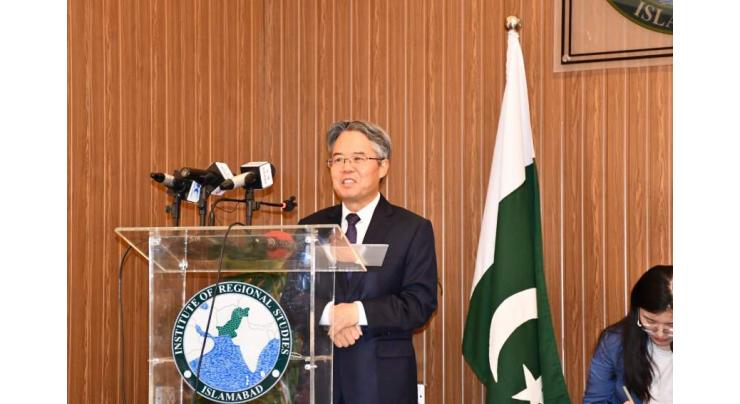
- Home
- Pakistan
- News
- China’s high quality development model offers new opportunities for Pakistan: Zaidong
China’s High Quality Development Model Offers New Opportunities For Pakistan: Zaidong
Mohammad Ali (@ChaudhryMAli88) Published May 16, 2024 | 07:06 PM

Chinese Ambassador, Jiang Zaidong at a well-attended symposium on the Transformation of China’s Economy to High-Quality Development Model organized by the Institute of Regional Studies (IRS) said the keenness on Pakistan’s side to greatly enhance the ongoing commercial cooperation was welcoming as it would inject new impetus into China-Pakistan cooperation as China enters a new development phase
ISLAMABAD, (UrduPoint / Pakistan Point News - 16th May, 2024) Chinese Ambassador, Jiang Zaidong at a well-attended symposium on the Transformation of China’s Economy to High-Quality Development Model organized by the Institute of Regional Studies (IRS) said the keenness on Pakistan’s side to greatly enhance the ongoing commercial cooperation was welcoming as it would inject new impetus into China-Pakistan cooperation as China enters a new development phase.
Dispelling the impression of an overcapacity problem being faced by China, Ambassador Zaidong said that China did not have a problem of ‘overcapacity’ as China was exporting to the whole world and had a matching production capacity. "China is ready to work with Pakistan to implement the important consensus reached by leaders of the two countries," he said in a news release.
Ambassador Zaidong explained that to promote an in-depth integration of China’s new development of 5Cs with 5Es (5 Corridors: growth corridor, livelihood-enhancing corridor, innovation corridor, green corridor and open corridor) Pakistan and China needed yet closer cooperation both at the governmental as well as the societal level.
While China’s new energy product exports were already benefiting the world and making important contributions to addressing climate change issues and promoting green transformation, with the new developmental plans China aspired to transform and upgrade traditional industries, cultivate and strengthen emerging industries, and lay out the construction of future-oriented industries.
Earlier, in his welcoming remarks, Ambassador Jauhar Saleem, President IRS, said that Pakistan-China relations were cornerstone of Pakistan foreign relations and were characterized by cordiality and multifaceted partnerships. He emphasized that ‘China-Pakistan Economic Corridor (CPEC) was a testament to the enduring friendship, providing immense opportunities for collaboration and development’, and Pakistan deeply values this historic bond between our two nations.
Chairing the session, former Foreign Minister, Ambassador Jalil Abbas Jilani, said that China’s economic progress was the outcome of rapid industrialization, urbanization, and export-oriented policies, added that in the past decade and a half, China alone had been the main driver of world economic growth, accounting for 35% of global nominal GDP growth.
‘China’s economic momentum initiatives like ‘Made in China 2025’, and Global Development Initiatives present wondrous opportunities for economic expansion domestically and internationally, and countries such as Pakistan could greatly benefit from it.
Professor Zhou Rong, Senior Fellow at Renmin University of China, emphasized that Pakistan could learn from China's development approach, and focus on implementation and for that, he suggested working on joint ventures and entrepreneurship initiatives. He urged Pakistan to embrace the Chinese language to further deepen cultural ties between the two countries.
Former envoy of Pakistan to China, Ambassador Moin ul Haq said that in line with the evolving technological landscape, skill training for Pakistani youth was extremely important to gauge the demands of the partnership effectively.
He also emphasized the need for Pakistan to establish smart linkages to drive innovation in research and development.
A faculty member at Quaid-i-Azam University, Dr Ahmed Ijaz Malik emphasised upon fostering a two-way partnership to fully realize benefits. He noted that ‘China's strategic alliances and its potential to facilitate reverse tech development, offered Pakistan a collaborative opportunity.
He suggested that university students in Pakistan be engaged by providing them training and internships in China so that they could later be utilised as skilled workers.
CEO of the Asian Institute of Eco-civilization, Research and Development (AIERD), Shakeel Ahmed Ramay underscored the imperative for Pakistan's inclusion in the global supply chain framework. Drawing lessons from the Chinese governance structure. He also emphasised the importance of adopting a skills-based and meritocratic approach to address Pakistan's governance challenges effectively.
He opined that an undesirable and inadequate pace of industrialization had hindered the operationalisation of Special Economic Zones under the CPEC, and called for a paradigm shift to expedite industrial development and optimize the potential of SEZs for economic growth.
Related Topics
Recent Stories

32 MoUs inked at Pakistan-China Business Forum in Shenzhen

ICC T20 World Cup 2024: Pakistan, USA to take on each other today

Currency Rate In Pakistan - Dollar, Euro, Pound, Riyal Rates On 6 June 2024

Today Gold Rate in Pakistan 06 June 2024

All resources to be used for welfare of Attock people: Governor

Markets mixed as US jobs data tempered by economy worries

Chairman DDMA, DC chairs Meeting on Desilting of Nullahs, Sewerage Lines

PML-N leadership believes in democratic norms: Sanaullah

Tennis: French Open results - 1st update

Andreeva shocks ailing Sabalenka, faces Paolini in French Open semis

Rohit plays down injury scare after India rout Ireland in T20 World Cup

Nature reborn a year after Ukraine dam blast
More Stories From Pakistan
-
Pakistani engineers participate in Huaneng Craftsman Cup 2024
9 minutes ago -
MoFE&PT launches character education & life skills strategy from grade 1-5
19 minutes ago -
Two accused injure by firing of own accomplice
19 minutes ago -
Bird hazard control committee meets:
19 minutes ago -
Five injure after roof collapsed
19 minutes ago -
ANF recovers 373 kg drugs in seven operations
19 minutes ago
-
PIC orders to disclose private hospital’s negligence inquiry report
39 minutes ago -
Digital cattle buying trend brings relief to buyers
48 minutes ago -
Governor summons Sindh Assembly session on June 7
49 minutes ago -

32 MoUs inked at Pakistan-China Business Forum in Shenzhen
50 minutes ago -
MoHR enhances regional directorates' capacity for labour & human rights initiatives
59 minutes ago -
Ministry taking steps to introduce climate friendly buildings, Romina Alam
1 hour ago
